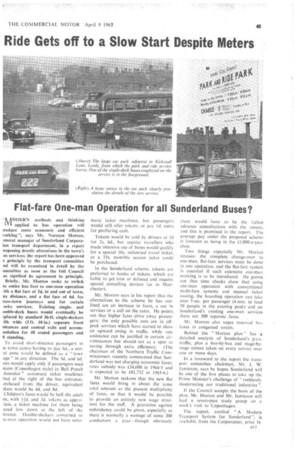Flat-fare One-man Operation for all Sunderland Buses?
Page 45

If you've noticed an error in this article please click here to report it so we can fix it.
' MODERN methods and thinking applied to bus operation will troduce more economic and efficient vorking ", says Mr. Norman Morton, 'eneral manager of Sunderland Corporaion transport department, in a report Toposing drastic alterations in the town's us services; the report has been approved is principle by the transport committee mid will be examined in detail by the ommittee as soon as the full Council as signified its agreement in principle. Briefly, Mr. Morton seeks to switch hie entire bus fleet to one-man operation rith a flat fare of 3d. in and out of town, fly distance, and a flat fare of 6d. for ross-town journeys and for certain torks services. Existing singleand ouble-deck buses would eventually be rplaced by standard 36-ft. single-deckers ith wide (3 ft. 10 in.) separate front 'trances and central exits and accomiodation for 48 seated passengers and 8 standing.
To avoid short-distance passengers in )e town centre having to nay 6d., a cell al zone would be defined as " town age" in any direction. The 3d. and 6d. tres would apply only if passengers used 'kens (Copenhagen style) in Bell Punch Autoslot " automatic ticket machines tted at the right of the bus entrance; Jrchased from the driver, equivalent ckets would be 4d, and 8d.
Children's fares would be half the adult ite, with 11d. and 3d. tokens as appro-late, a ticket machine for them being aced low down at the left of the itrance. Double-deckers converted to le-man operation would not have auto
matic ticket machines, but passengers would still offer tokens, or pay Id. extra for proffering cash.
Tokens would be sold by drivers at 10 for 2s. 6d., but regular travellers who made intensive use of buses would qualify for a special 10s. unlimited travel ticket, or a 35s. monthly season ticket could be purchased.
In the Sunderland scheme, tokens are preferred to books of tickets, which are liable to get torn or defaced and require special cancelling devices (as in MancheSter).
Mr. Morton says in his report that the alternatives to the scheme he has outlined are an increase in fares, a cut in services or a call on the rates. He points out that higher fares drive away passengers; the only possible cuts are in offpeak services which have started to show an upward swing in traffic, while rate assistance can be justified in certain circurnstances but should act as a spur to saving through extra efficiency. (The chairman of the Northern Traffic Commissioners recently commented that Sunderland was not charging economic fares; rates subsidy was £54,000 in 1964-5 and is expected to be £81,732 in 1965-6.)
Mr. Morton reckons that the new flat fares would bring in about the same total amount as the present multiplicity of fares, so that it would be possible to provide an entirely new wage structure for the staff. A guarantee against redundancy could be given, especially as there is normally a wastage of some 200 conductors a year--though obviously
there would have to be the fullest advance consultations with the unions. and this is promised in the report. The average pay under the proposed scheme is foreseen as being in the £1,000-a-year class.
Two things especially Mr. Morton stresses: the complete change-over to one-man, fiat-fare services must be done in one operation, and the flat-fare system is essential if such extensive one-man working is to be introduced. He points out that time checks show that using one-man operation with conventional multi-fare systems and manual ticket issuing, the boarding operation can take over 5 sec. per passenger (4 min. to load 50 people in the evening peak) and on Sunderland's existing one-man services there are 300 separate fares.
Mr. Morton also urges reserved bus lanes in congested streets.
Behind the " Morton plan " lies a detailed analysis of Sunderland's p.s.v. traffic, plus a bus-by-bus and stage-bystage census taken on every service over one or more days.
In a foreword to the report the transport committee chairman, Mr. J. W. Jamieson, says he hopes Sunderland will be one of the first places to take up the Prime Minister's challenge of " ruthlessly modernizing our traditional industries ".
if the Council accepts the basis of the plan. Mr. Morton and Mr. Jamieson will lead a seven-man study group on a week's visit to Copenhagen.
The report, entitled "A Modern Transport System for Sunderland ", is available from the Corporation, price Is.




































































































































